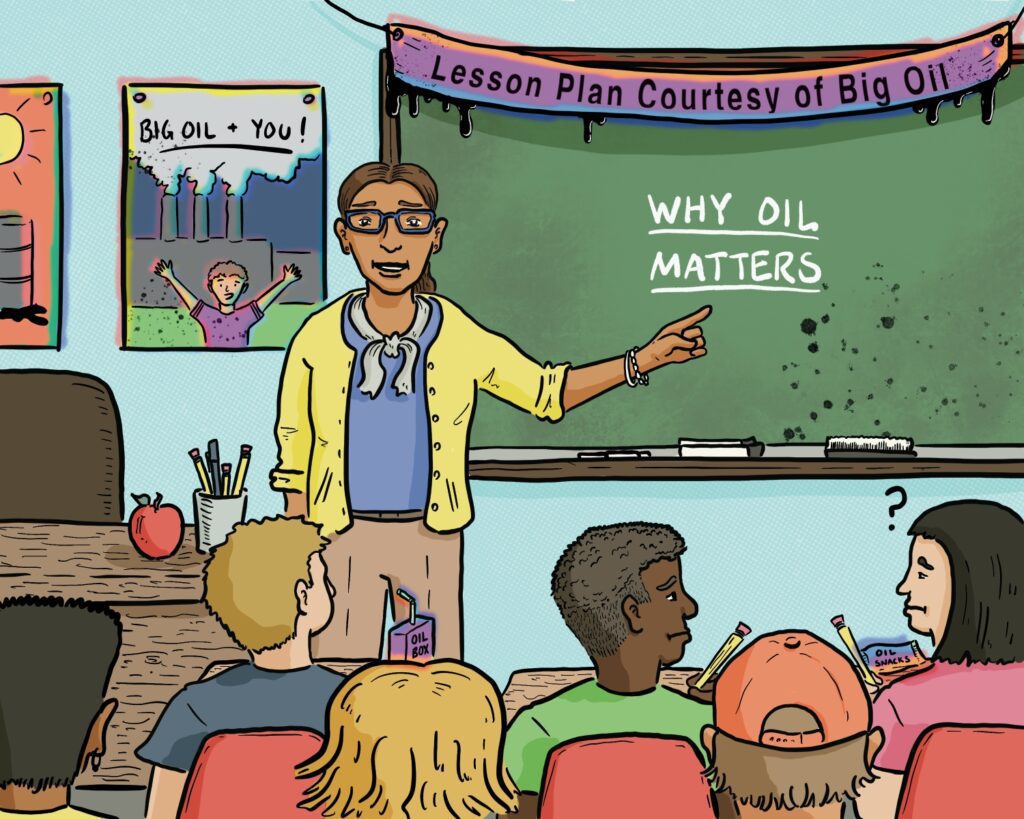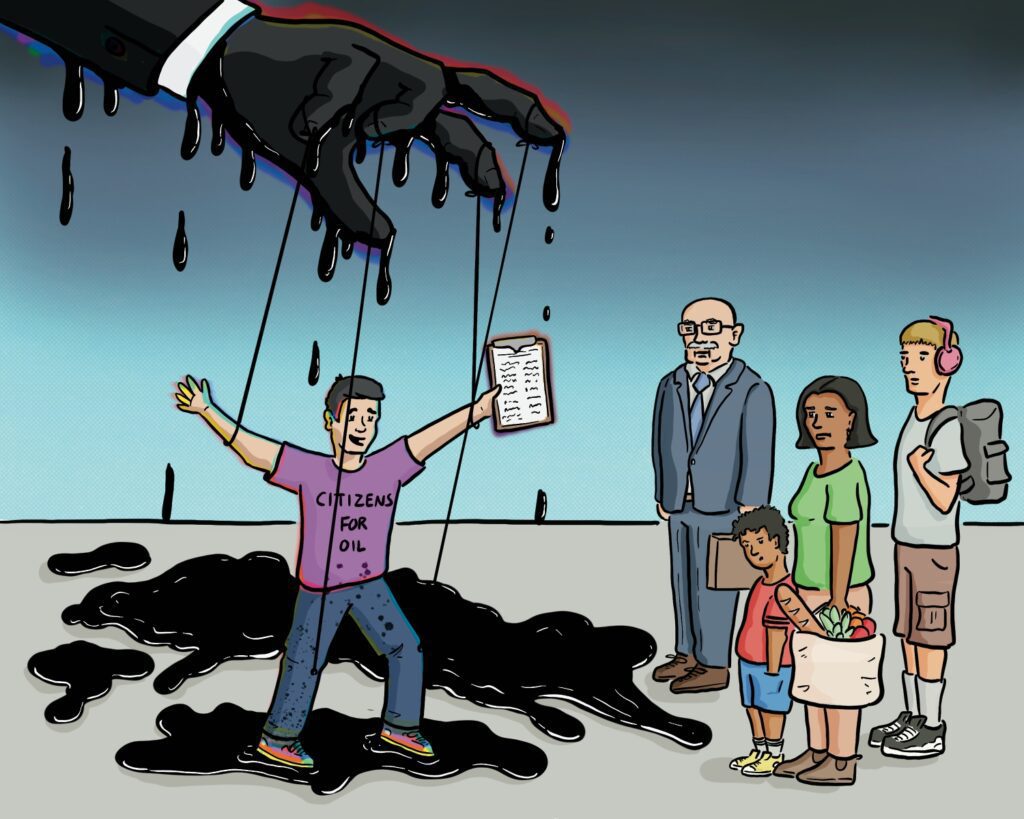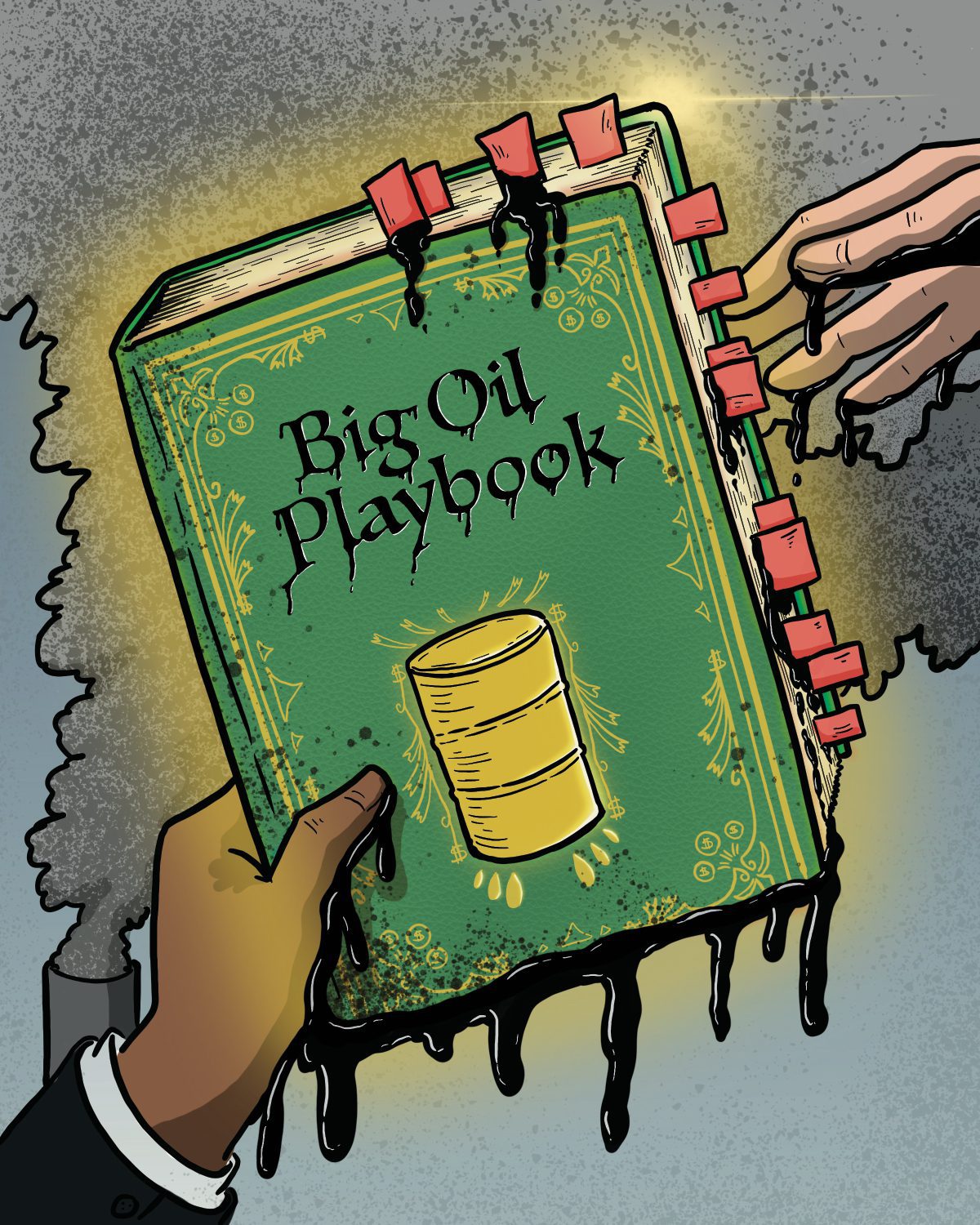You already read about Big Oil’s first two tactics. Here are some more from the list.
Tactic 3: The Curriculum Curator – Infiltrating Education
The tactic: Big Oil intervenes in public education in order to seed support for fossil fuels at an early age. Fossil fuel industry players have developed curricula for teachers, books and other resources that are supplied to kids’ classrooms. Oil and gas companies also sponsor activities and facilitate school trips that promote the fossil fuel extraction industry. Fossil fuel companies can also influence education through government partnerships or funding third-party non-profits that supply materials or program support for schools. Big Oil also has a long history of paying for or sponsoring grants, awards, post-secondary programs or buildings, and community school initiatives that don’t directly promote oil and gas, but aim to embed the company in the community, similar to the tactic of “buying community consent”.
The strategy: The industry’s influence on education content aims to “obscure the industry’s role in driving climate change while also limiting public understanding of the urgent need to transition away from fossil fuels”, according to a report by the Canadian Association of Physicians for the Environment (CAPE) and climate advocacy organization For Our Kids. If people can’t connect the dots between fossil fuels and climate change, then Big Oil is less likely to be held accountable for the climate damages that their polluting products are causing. Industry’s efforts to undermine the alternatives to fossil fuels prolongs public support for Big Oil’s production, keeping the profits flowing to extraction companies. 
Where you’ve seen it before:
According to CAPE and For Our Kids’ 2025 report on fossil fuel companies’ influence on education in Canada, at least 39 oil and gas companies and 12 industry-tied organizations are involved in climate education. These companies supply education materials either directly to schools, or through government partnerships or third-party nonprofits they fund. These materials and programs extend to reach every province in Canada, and include companies such as Shell, TC Energy and Pathways Alliance.
For example, in April 2024 the Alberta government quietly published a curriculum framework that calls on teachers to promote Alberta’s oil and gas industry to schoolchildren. The curriculum framework was developed without consultation from teachers. That same year, Saskatchewan Premier Scott Moe announced new oil and gas courses would be offered to grade 11 and 12 students in the province. Research into Saskatchewan’s education system also showed that third-party, industry-funded groups have an outsized influence on how climate change is taught in Saskatchewan schools.
Exxon worked on a series of kids’ videos promoting CCS. Exxon executives asked the creative team working on the kids’ series to steer away from the idea that carbon is bad or that carbon capture is difficult. An email accessed by subpoena during a legal investigation into Exxon included feedback to the creative team asking them to “De-emphasize the concept that catching carbon is difficult or hard.”
The fossil fuel industry materials and resources pouring in schools doesn’t just affect what’s being taught, it can also affect other administrative decisions. For example, when Dalhousie University was considering divesting the school’s endowment from fossil fuels, the financial gifts and work-study program that Shell contributed to the school were used as leverage to convince the university decision-makers to shoot down divestment.
Tactic 4: The Petro-Puppeteer – Influencing the Public
The tactic: Big Oil works hard to make people feel proud of and attached to the fossil fuel industry. It runs marketing and branding campaigns that encourage people to incorporate support for the oil and gas into their personal identity and sense of national or regional pride. It even encourages people to publicly voice their support for fossil fuels, and defend extraction companies – essentially creating advocates on behalf of the industry, copying the tactics used by advocates for social causes.
Except some of these people aren’t out cheering for oil and gas out of the kindness of their hearts. The oil industry funds astroturf groups and campaigns to facilitate pro-oil public activism. And they support grassroots NIMBY anti-renewable groups and far-right conspiratorial groups with resources, platforms, anti-climate messaging, and other forms of legitimization.
The strategy: Pro-oil advocacy by everyday people, and fossil fuel workers in particular, is valuable to Big Oil because it creates another avenue to reach and influence political decision makers, reinforces the perceived popularity of support for fossil fuels, and generally helps maintain their social license. When the pro-oil advocates can be mobilized in a targeted way against specific policies it can weaken or roll back climate action.
Where you’ve seen it before:
The Canadian Gas Association, one of the fossil fuel industry’s lobby groups, began secretly funding a campaign called “Voice for Energy” in 2023. The Voice for Energy campaign runs high-production value videos and digital advertisements across social media platforms. Their ads range from feel-good videos with diverse actors talking about how they use and love “natural” gas so much that they’re compelled to speak up to protect the industry, to videos that use scare tactics and misinformation about renewables to undermine people’s trust in transitioning to clean energy and reducing fossil gas. The Voice for Energy website directs people to email elected officials with their pre-drafted letter. Previously this form letter advocated that local governments “protect” fossil fuels against laws that would restrict new gas hookups in buildings. The letter now urges the government to “ensure Canada continues to invest in natural gas”.
That’s right, fossil fuel companies are paying for campaigns that convince regular people to tell the government to put taxpayer money back into these for-profit companies.
Political advocacy is common for non-profit organizations that focus on social issues, like human rights, environmental protection, and other campaigns for public goods. When private interests set up these advocacy campaigns, that appear people-driven but actually further corporate interests, they’re called ‘astro-turf’ groups. That’s because they are modeled after or appear to be “grassroots” advocacy, but don’t have the authenticity of social movements. The Voice for Energy website doesn’t disclose anywhere who is behind the campaign or what Voice for Energy is, but an investigation by journalists at DeSmog revealed its funding from the Canadian Gas Association. Environmental Defence has identified at least 28 astroturf groups or campaigns in Canada.
Another example is Energy United, a Canadian advocacy group that makes inflammatory anti-environmentalist and pro-oil social media content. The CBC estimates that in a one year period Energy United spent between $135,200 and $174,435 on 65 Facebook and Instagram ads, reaching as many as 16.5 million Canadians. Their website also hosts a ‘Take Action’ page to email elected officials. Energy United calls itself ‘grassroots’, but unlike a registered charity its website does not list its funding sources. So who is paying for its well funded ad campaigns? Energy United’s online Meta ad registrations list it under the Maple Leaf Institute. The secretive Maple Leaf Institute has no website, no academic affiliation, and is listed as a soliciting corporation – meaning it received more than $10,000 in income from public sources. The only publicly traceable information about it is the names of its four directors, all of whom were previously employed at the Canadian Association of Petroleum Producers. Three are also partners in Garrison Strategy, a public and government relations firm based in Calgary.
From the group Canada Action Network and their “I ❤️ 🍁 Oil” merchandise, which received $100,000 from ARC Resources, to the ‘True North’ anti-climate “news” website that has received at least $530,000 from fracking pioneer and climate villain Gwyn Morgan, the fossil fuel industry has built up a network of organizations that try to mobilize the public in support of fossil fuels.









